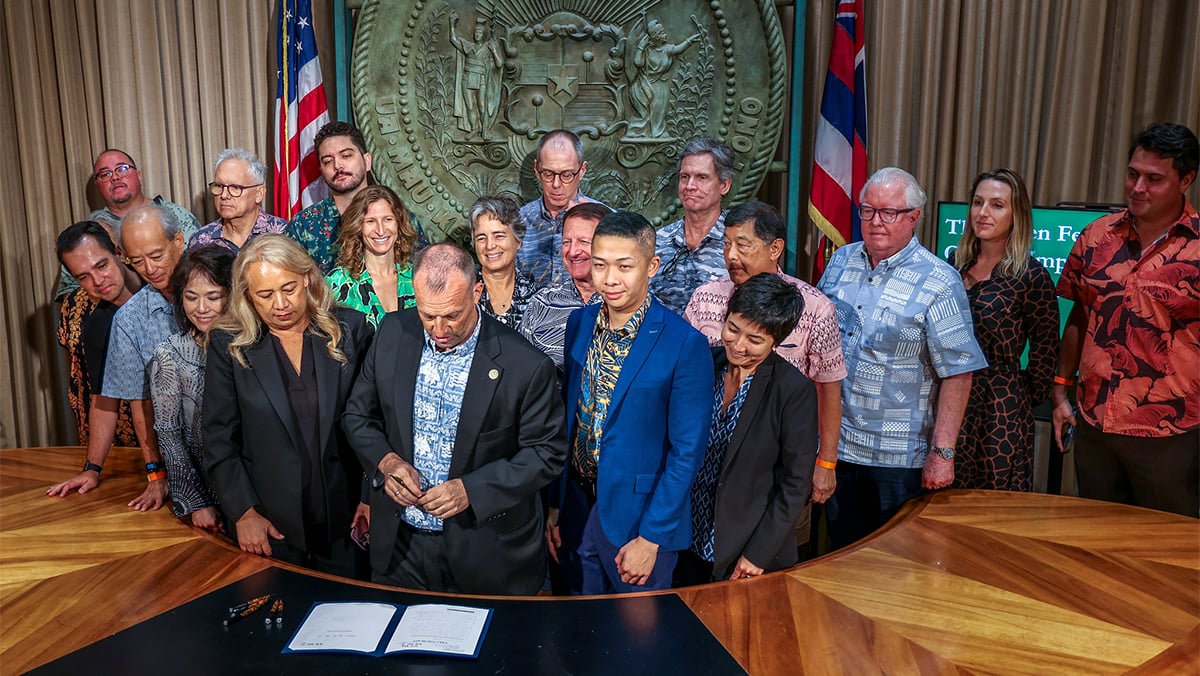Hawaiʻi governor Josh Green has signed into law Act 96 (Senate Bill 1396), a landmark initiative that establishes the first-ever climate impact fee, or “Green Fee,” in the nation, marking a historic moment for Hawaiʻi’s climate, environment and communities. The Green Fee addresses the critical need to build resiliency against the impacts of climate change by providing a stable source of funding for environmental stewardship, hazard mitigation and sustainable tourism.
Following the devastating Maui wildfires and in response to the growing frequency and intensity of natural disasters across Hawai‘i and the nation, Governor Green established the Climate Advisory Team (CAT) in 2024, led by Chris Benjamin and consisting of a team of leaders, to develop community-informed policy recommendations. A key recommendation of the CAT was to establish a dedicated source of funding for climate change mitigation and disaster resilience. The CAT recommended the transient accommodations tax (TAT) as a potential revenue source.
Senate Bill 1396 increases the TAT rate by 0.75 percent beginning in 2026 and levies, for the first time, the TAT on cruise ships that port in the state. Assessing the TAT on cruise ships—a sector of transient accommodations that has long gone untaxed under the TAT—promotes equity across the tourism industry, ensuring that all visitors to Hawai‘i contribute to the islands’ long-term resilience and well-being.
While fees may not be the most popular method of revenue generation, stakeholder dialogue has affirmed that visitors are willing to pay a climate impact fee in order to support Hawaiʻi’s environmental protection efforts and preserve the beauty and cultural heritage of the islands for future generations. The Green Fee ensures that visitors share in the responsibility and privilege of environmental stewardship and sustainable tourism.
Representative Adrian Tam (District 24 – Waikīkī), said, “The funds raised by this bill will go toward much-needed environmental stewardship as well as erosion mitigation and restoration projects, so it is really a win-win for all of us. The signing of this bill will ensure that the investments in resilience and taking preventive measures will protect Hawaiʻi’s environment and our economy, and it will soon save taxpayer dollars in the long run.”
The Green Fee is projected to generate $100 million annually, and the Green Administration will work with the legislature to confirm projects next session as revenue becomes available. These projects include environmental stewardship, climate and hazard resiliency, and sustainable tourism.
For more information, visit www.governor.hawaii.gov.
Related Stories
Hyatt Regency Maui Unveils 45th Anniversary Offers
Outrigger Kona Resort & Spa Debuts Renovated Spaces
Sheraton Waikiki Beach Resort Has New Family Programming
Pleasant Holidays Debuts New, Interactive Hawaii Sales Brochure
Source link

